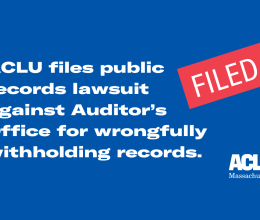
Proposed legislation fails to guarantee equitable access and undermines the spirit of the Open Meeting Law
The state’s Joint Committee on Municipalities and Regional Government is scheduled to hold a public hearing today on parts of Governor Healey’s Municipal Empowerment Act S.2571. A coalition of democracy, disability access, and open government advocates expressed strong concerns about the bill’s consequences for access to local government meetings included in sections 2-5. The proposal would make the format of local open meetings completely discretionary instead of maximizing access by guaranteeing hybrid public meetings with both in-person and remote access.
The ACLU of Massachusetts, Boston Center for Independent Living, Disability Law Center, Common Cause Massachusetts, League of Women Voters of Massachusetts, Massachusetts Newspaper Publishers Association, MASSPIRG, New England First Amendment Coalition, and New England Newspaper & Press Association released the following joint statement in response to the bill:
“The Municipal Empowerment Act falls short on ensuring access to public meetings. It will shut people out of the democratic process by only allowing — and not requiring — municipalities to provide hybrid participation options. Giving every government body complete discretion about how to provide public access to their meetings means people with disabilities or other reasons they can’t attend meetings will be completely shut out when city councils, select boards, or school committees decide to hold meetings exclusively in person.
“Last session, the House passed forward-thinking legislation that would have guaranteed hybrid participation by entities under the Open Meeting Law, and together the House and Senate passed a $30 million bond authorization to support municipal IT infrastructure, which Governor Baker vetoed. Passing on the opportunity to build on the Legislature’s earlier efforts, the language in the Municipal Empowerment Act is a major step backwards. It’s time to guarantee the permanent removal of long-standing barriers to participation that particularly impact people with disabilities, caregiving responsibilities, or limited transportation. We look forward to working with the House and Senate to ensure a reasonable guarantee of public access by strengthening the Open Meeting Law for residents of all 351 cities and towns.
“We’re also concerned that a matter of such significant importance is being considered by the Joint Committee on Municipalities and Regional Government instead of the Joint Committee on State Administration and Regulatory Oversight, which has substantial expertise in this area and is able to properly consider the application of the Open Meeting Law to state agencies as well as municipalities. In addition, the language in the bill would undermine the spirit of the Open Meeting Law, because it could result in the level of access to local public meetings varying dramatically from one municipality to the next. The Open Meeting Law has always ensured a statewide standard for public access for all 7 million Bay Staters across all 351 cities and towns.”
Background:
In spring of 2023, the coalition conducted a survey of every city council, select board, and school committee in the state. According to that survey, more than half of those bodies are already conducting fully hybrid or live-streamed meetings. Indeed, hybrid meetings are already standard operating procedure for many government entities in municipalities of every size, from Boston to Gosnold.
City councils and select boards: 45% of city council and select board meetings are fully hybrid and 17% more are live streamed. In total, 62% are fully hybrid or live streamed.
School committees: 35% of school committee meetings are fully hybrid and 25% are live streamed. In total, 60% are fully hybrid or live streamed.
The coalition supports a legislative proposal (H.3040/S.2024) that will ensure greater access to open meetings for everyone—particularly for people with disabilities, caregiving responsibilities, or limited transportation—by requiring options for officials and members of the public to attend meetings in person or remotely.







